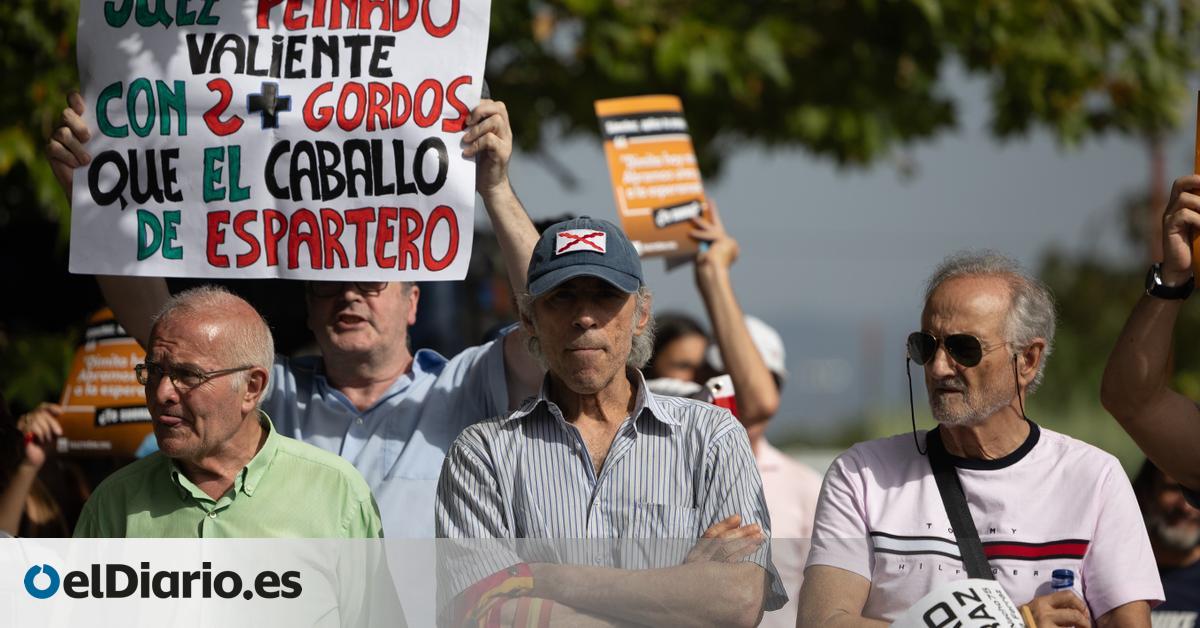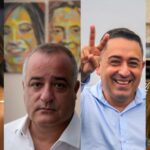
The investigation against Begoña Gómez faces the summer break without, to date, any of the proceedings launched by Judge Juan Carlos Peinado having yielded clear indications of a crime against the wife of the President of the Government. After just over three months of investigation, the balance leaves two exculpatory reports from the elite unit of the Civil Guard, half a dozen testimonies denying irregularities and an appearance of a few minutes by Pedro Sánchez in one of the offices of the Moncloa. With two testimonies pending until the end of August, the focus is on the judge and his next steps in a case driven only by popular accusations from the extreme right.
Judge Peinado’s investigation, following the intervention of the European Prosecutor’s Office and the delimitations of the Madrid Court that he has ignored, focuses on several fronts without ruling out any conduct by Begoña Gómez since her husband became President of the Government. One is the multimillion-dollar public contracts obtained by the businessman Carlos Barrabés. Another is the multimillion-dollar bailout of Air Europa. And a third branch, recently opened and constantly expanding, is the relationship of the wife of the President of the Government with the Complutense University of Madrid.
Several of these lines of investigation have been rejected by the Central Operational Unit (UCO) of the Civil Guard. The alleged relationship of Begoña Gómez with the multi-million euro rescue of Air Europa, for example, is not supported by any evidence: the Madrid Court spoke of “mere conjectures” in the Manos Limpias complaint and the Civil Guard ruled out that having coincided at two events with Javier Hidalgo, director of Globalia, would allow going further. “There is no evidence that these events could be linked to the ministerial decision of the rescue.”
The part of the case that affected the public contracts awarded to businessman Carlos Barrabés, who is accused of having benefited from his closeness to Begoña Gómez, was drastically reduced after the European Prosecutor’s Office requested a significant part of the case. Before that, two journalists testified to defend their information and acknowledge that they found no evidence that the wife of the President of the Government had exerted pressure to benefit Barrabés. Something that the Central Operational Unit also dismisses: the letters of recommendation that Gómez and several institutions signed in favor of the businessman are not a “differentiating element” in his favor.
Barrabés himself has denied this alleged preferential treatment pointed out by the popular accusations, which have focused on the visits he made to Moncloa, most of them to meet with Begoña Gómez and one of them at a meeting of the President of the Government with businessmen from the innovation sector. The judge wants to know if these visits served to grease the public contracts of Barrabés with Begoña Gómez by making use of their marriage for the benefit of both. Barrabés has even explained that Gómez was not even present the only time he saw Sánchez.
The third – and for now last – aspect of the case has to do with the relationship between Begoña Gómez and the Complutense University of Madrid. Specifically, whether the wife of the President of the Government received any preferential treatment in order to direct a competitive chair of social transformation and whether, in addition, she irregularly managed software developed within the educational centre.
The rector of the Complutense University, Joaquín Goyache, has already appeared twice, the first time as a witness and the second time as a defendant, a condition that has been appealed by the Public Prosecutor’s Office. On both occasions he has denied having given preferential treatment to Gómez and has distanced himself from the creation of the chair, acknowledging that he also went to Moncloa to speak with her. In parallel, the Complutense University itself has written to the judge several times to acknowledge that it has not found evidence of irregularities but requesting that the magistrate be the one to investigate whether Gómez incurred in any illegality by managing software created within his chair.
The judge has made a move in the last few hours and has launched a series of proceedings to delve deeper into this aspect of the case, that of the University, which has now become the main one after the two previous ones have not yielded results. He has asked the UCM to provide the data of other extraordinary chairs to compare the curriculum of those responsible for them with that of the wife of the President of the Government. He has also asked the Instituto de Empresa for the contract that it signed with her when she took charge of the Africa Center.
Two witnesses and two pending complaints
The magistrate also has two pending witness statements scheduled for August 26. The first is Leticia Lauffer, former director of Wakalua, and the second is Luis Miguel Ciprés, director of the business group of Juan Carlos Barrabés. Lauffer was at the head of this ‘global innovation hub’ created by Globalia and the World Tourism Organization when he signed a sponsorship with the Africa Center directed by Begoña Gómez in which 1,700 euros were disbursed in total.
This businesswoman already appeared at the beginning of last June before the Senate’s commission of inquiry opened following the ‘Koldo case’ to investigate irregularities in the sale of masks and medical supplies to public administrations during the pandemic. Over the course of two hours, Lauffer explained that she met with Gómez several times to discuss issues of innovation, but nothing related to the rescue of Air Europa, one of the accusations of Manos Limpias dismissed by the Provincial Court of Madrid and the Civil Guard.
Of the 40,000 euro sponsorship they agreed to for the Africa Center run by Gómez, only 1,700 euros were paid, he explained. And during their conversations, he said, Begoña Gómez never acted as “the president’s wife” without wanting to “get or extract something.” HazteOir has already offered the judge written testimony from Lauffer’s ex-husband, who according to the ultra-Catholic organisation is willing to explain the contacts the businesswoman had with Gómez.
Ciprés’ testimony was originally scheduled for a few days ago and the judge decided to summon him again for August after the businessman, nervous, did not remember some details necessary for the case.

It will be at the end of September, with all these proceedings already completed, when the body supervising the case will study the appeals that the lawyer Antonio Camacho and the Public Prosecutor’s Office have presented against various resolutions of Judge Peinado. The Provincial Court of Madrid announced that it would begin to study these allegations on September 30, which above all ask in the case of Gómez for the case against her to be closed.
Meanwhile, Judge Peinado will be awaiting the High Court of Justice of Madrid, where the magistrates already have two complaints on the table accusing him of revealing secrets and prevaricating in the management of this case. One was presented by the State Attorney’s Office on behalf of Pedro Sánchez, pointing out that he twisted the law to force his testimony to be in person at the Moncloa and not in writing. The second has been presented by Gómez in the last few hours and accuses the instructor, directly, of carrying out a “perverse and prospective” investigation against her.
It is expected that the judge will not lack offers and requests from the promoters of the case: the popular accusations made by Vox, HazteOir, Manos Limpias, Iustitia Europa and the lawyer Aitor Guisasola. Some have asked for Javier Hidalgo (Globalia) to testify, for an investigation into the subsidies of a company for which Gómez worked before her husband was appointed president of the Government or the businesswoman’s bank accounts. The far-right party led by Santiago Abascal has said, through its top leader, that it does not rule out even raising the question of indicting Pedro Sánchez.
Source: www.eldiario.es

